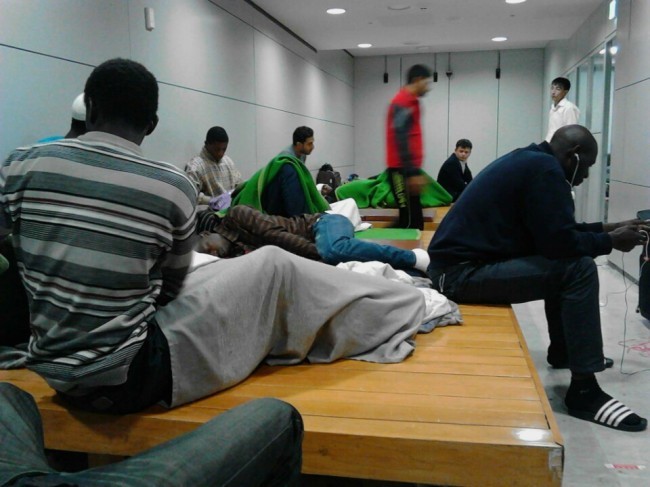The Constitutional Court on Tuesday dismissed the request for review on the constitutionality of the South Korean government holding deportees in protection centers for an unlimited duration.
The 5-4 decision thereby upheld the constitutionality of the immigration law that allows the authorities to keep illegal residents until their repatriation.
Illegal residents who are caught during clampdowns, or while committing crimes, are sent to designated shelters until their deportation. The period of such detention is usually prolonged due to administrative reasons. The shelters also house a number of refugee seekers who wait through their application process that takes up to several years.
 |
Deportees sit and sleep on a makeshift platform at the deportation room inside Incheon International Airport. (NANCEN) |
The constitutional appeal was filed by an Iranian whose personal information was withheld. The Iranian, who had illegally lived here since 2007, requested for refugee status in 2012. Until the government gave the person asylum status in 2014, the Iranian was held in the protection facility. The person contended that it was a violation of human rights to have asylum seekers confined in the facility, taking issue with how the detention period does not have a maximum limit.
Noting that the Iranian was eventually granted the refugee status, five of the judges dismissed the case. They, however, released their views that the immigration control regulation is constitutional.
“The protection and monitoring is necessary for foreigners who are ordered to be deported for doing illegal activities, as it cannot be assured that there will be no cases of runaways,” they said. They also mentioned the possibility of the deportees using the refugee application process to evade deportation.
“But there is also a need to adopt a rule that limits the time of protection to prevent unfair detention,” they added.
The four other judges said protecting the foreigner before deportation breached basic rights.
“There exists unconstitutionality in that the regulation does not have an upper limit on its ‘protection’ that is more relevant to ‘detention,’ and that it treats asylum seekers the same way as other persons subject to deportation,” they said.
“There should a system that allows a review by a third party organization over the validity of the confinement,” they said.
By Lee Hyun-jeong (
rene@heraldcorp.com)





![[Exclusive] Hyundai Mobis eyes closer ties with BYD](http://res.heraldm.com/phpwas/restmb_idxmake.php?idx=644&simg=/content/image/2024/11/25/20241125050044_0.jpg)
![[Herald Review] 'Gangnam B-Side' combines social realism with masterful suspense, performance](http://res.heraldm.com/phpwas/restmb_idxmake.php?idx=644&simg=/content/image/2024/11/25/20241125050072_0.jpg)

